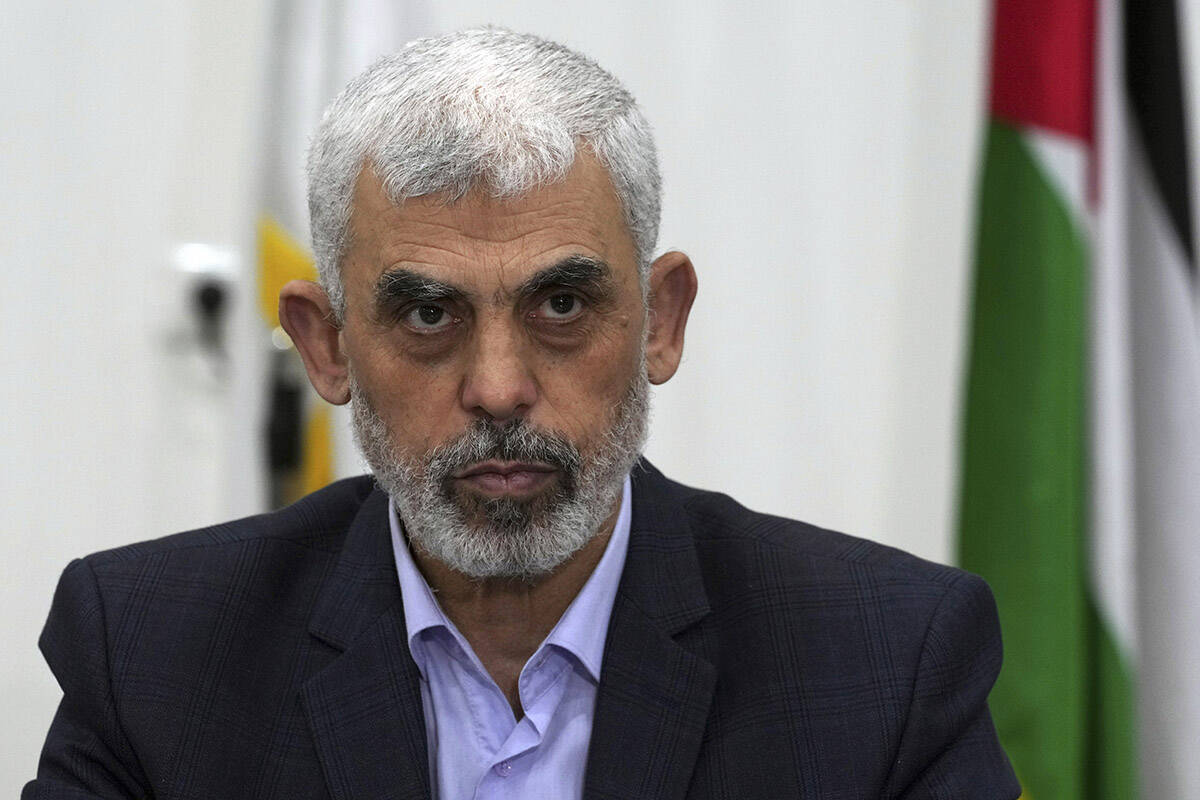Hamas’ top leader killed in Gaza, Israel’s foreign minister says
DEIR AL-BALAH, Gaza Strip — Israeli forces in Gaza killed Hamas’ top leader Yahya Sinwar, a chief architect of last year’s terrorist attack on Israel that sparked the war, the military said Thursday. Troops appeared to have run across him in a battle, only to discover afterward that a body in the rubble was the man Israel has hunted for more than a year.
Sinwar has topped Israel’s most wanted list since the beginning of the Israel-Hamas war just over a year ago, and his killing strikes a powerful blow to the terrorist group. There was no immediate confirmation from Hamas of his death.
The military confirmed Sinwar’s death after conducting DNA and other tests on a body that it said was among three terrorists killed Wednesday during operations in Gaza. Foreign Minister Katz called Sinwar’s killing a “military and moral achievement for the Israeli army,” saying it would “create the possibility to immediately release the hostages.”
Sinwar was one of the chief architects of Hamas’ attack on Israel on Oct. 7, 2023, and Israel has vowed to kill him since the beginning of its retaliatory campaign in Gaza. He has been Hamas’ top leader inside the Gaza Strip for years, closely connected to its military wing while dramatically building up its capabilities.
An Israeli security official said it appeared that the man who turned out to be Sinwar was killed in a battle, not in a planned targeted airstrike.
Photos circulating online showed the body of a man resembling Sinwar with a gaping head wound, dressed in a military-style vest, half buried in the rubble of a destroyed building. The security official confirmed the photos were taken by Israeli security officials at the scene. The official spoke on condition of anonymity because of the ongoing investigation.
The Israeli news site N12 said Sinwar appears to have been killed by chance in a battle on Wednesday. It said that troops tracked a group of terrorists into a building, then attacked the terrorists with tank fire, causing the building to collapse. As troops unearthed the dead terrorists, they noticed that one appeared to resemble Sinwar.
Sinwar was imprisoned by Israel from the late 1980s until 2011, and during that time he underwent treatment for brain cancer – leaving Israeli authorities with extensive medical records.
President Joe Biden has been briefed on Israel’s investigation into whether it killed Sinwar, and U.S. officials have been in close contact with Israeli officials throughout Thursday morning, according to a senior administration official.
Sinwar was chosen as Hamas’s top leader in July after his predecessor, Ismail Haniyeh, was assassinated in an apparent Israeli strike in the Iranian capital Tehran. Israel has also claimed to have killed the head of Hamas’ military wing Mohammed Deif in an airstrike, but the group has said he survived.
The report of his death came as Israeli forces continued a more than week-old major air and ground assault in the Jabaliya refugee camp in northern Gaza.
The Israeli military said it targeted a command center run by Hamas and Islamic Jihad inside the school. It provided a list of around a dozen names of people it identified as terrorists who were present when the strike was called in.
Israel has repeatedly struck tent camps and schools sheltering displaced people in Gaza. The Israeli military says it carries out precise strikes on terrorists and tries to avoid harming civilians.
Israel launched its campaign in Gaza to eliminate Hamas after the terrorists stormed into southern Israel on Oct. 7, 2023, killing some 1,200 people, mostly civilians, and abducting around 250 others. Some 100 captives are still inside Gaza, about a third of whom are believed to be dead.
Israel’s offensive has killed over 42,000 Palestinians, according to the Hamas-run Health Ministry in Gaza. It does not differentiate between civilians and combatants.
Israel allowed two shipments of aid to enter the north earlier this week after the United States warned it might reduce its military aid if its ally did not do more to address the humanitarian crisis.
Since the start of the conflict, Israeli forces have launched repeated operations into Jabaliya, a densely populated urban refugee camp dating back to the 1948 war surrounding Israel’s creation. The military says terrorists have repeatedly regrouped there after major operations.
Magdy reported from Cairo, Jeffery from Jerusalem. Associated Press writer Kareem Chehayeb in Beirut contributed.

















